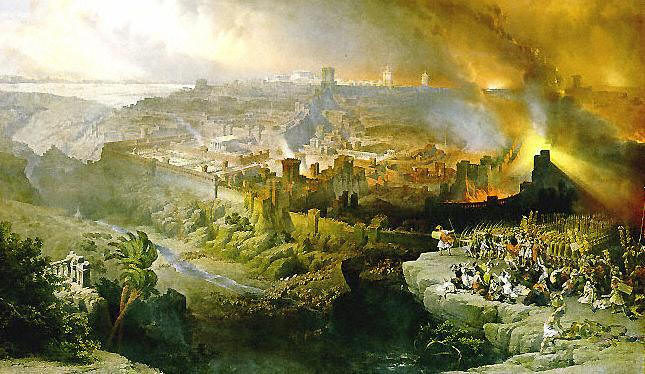
Time Of Destruction
Not a few women are in the crowd that follow the Uncondemned to His cruel death. Their attention is fixed upon Jesus. Some of them have seen Him before. Some have carried to Him their sick and suffering ones. Some have themselves been healed. The story of the scenes that have taken place is related. They wonder at the hatred of the crowd toward Him for whom their own hearts are melting and ready to break. And notwithstanding the action of the maddened throng, and the angry words of the priests and rulers, these women give expression to their sympathy. As Jesus falls fainting beneath the cross, they break forth into mournful wailing.
This was the only thing that attracted Christ’s attention. Although full of suffering, while bearing the sins of the world, He was not indifferent to the expression of grief. He looked upon these women with tender compassion. They were not believers in Him; He knew that they were not lamenting Him as one sent from God, but were moved by feelings of human pity. He did not despise their sympathy, but it awakened in His heart a deeper sympathy for them. “Daughters of Jerusalem,” He said, “weep not for Me, but weep for yourselves, and for your children.” From the scene before Him, Christ looked forward to the time of Jerusalem’s destruction. In that terrible scene, many of those who were now weeping for Him were to perish with their children. . . . CSA 37
-------------------------------------------
Christ would have averted the doom of the Jewish nation if the people had received Him. But envy and jealousy made them implacable. They determined that they would not receive Jesus of Nazareth as the Messiah. They rejected the Light of the world, and thenceforth their lives were surrounded with darkness as the darkness of midnight. The doom foretold came upon the Jewish nation. Their own fierce passions, uncontrolled, wrought their ruin. In their blind rage they destroyed one another. Their rebellious, stubborn pride brought upon them the wrath of their Roman conquerors. Jerusalem was destroyed, the temple laid in ruins, and its site plowed like a field. The children of Judah perished by the most horrible forms of death. Millions were sold, to serve as bondmen in heathen lands.
As a people the Jews had failed of fulfilling God's purpose, and the vineyard was taken from them. The privileges they had abused, the work they had slighted, was entrusted to others. COL 296
--------------------------------------------
At the time when Jerusalem was destroyed and the temple laid in ruins, many thousands of the Jews were sold to serve as bondmen in heathen lands. Like wrecks on a desert shore they were scattered among the nations. For eighteen hundred years the Jews have wandered from land to land throughout the world, and in no place have they been given the privilege of regaining their ancient prestige as a nation. Maligned, hated, persecuted, from century to century theirs has been a heritage of suffering.
Notwithstanding the awful doom pronounced upon the Jews as a nation at the time of their rejection of Jesus of Nazareth, there have lived from age to age many noble, God-fearing Jewish men and women who have suffered in silence. God has comforted their hearts in affliction and has beheld with pity their terrible situation. He has heard the agonizing prayers of those who have sought Him with all the heart for a right understanding of His word. Some have learned to see in the lowly Nazarene whom their forefathers rejected and crucified, the true Messiah of Israel. As their minds have grasped the significance of the familiar prophecies so long obscured by tradition and misinterpretation, their hearts have been filled with gratitude to God for the unspeakable gift He bestows upon every human being who chooses to accept Christ as a personal Saviour.
It is to this class that Isaiah referred in his prophecy, "A remnant shall be saved.
AA 379